- Home
- G. K. Chesterton
The Complete Father Brown Mysteries Collection Page 27
The Complete Father Brown Mysteries Collection Read online
Page 27
“Mr Frank Harrogate, I think,” he said. “I have had an introduction, but I do not mean to presume on it. The odd thing I have to say will come far better from a stranger. Mr Harrogate, I say one word and go: take care of your sister in her great sorrow.”
Even for Frank’s truly fraternal indifference the radiance and derision of his sister still seemed to sparkle and ring; he could hear her laughter still from the garden of the hotel, and he stared at his sombre adviser in puzzledom.
“Do you mean the brigands?” he asked; and then, remembering a vague fear of his own, “or can you be thinking of Muscari?”
“One is never thinking of the real sorrow,” said the strange priest. “One can only be kind when it comes.”
And he passed promptly from the room, leaving the other almost with his mouth open.
A day or two afterwards a coach containing the company was really crawling and staggering up the spurs of the menacing mountain range. Between Ezza’s cheery denial of the danger and Muscari’s boisterous defiance of it, the financial family were firm in their original purpose; and Muscari made his mountain journey coincide with theirs. A more surprising feature was the appearance at the coast-town station of the little priest of the restaurant; he alleged merely that business led him also to cross the mountains of the midland. But young Harrogate could not but connect his presence with the mystical fears and warnings of yesterday.
The coach was a kind of commodious wagonette, invented by the modernist talent of the courier, who dominated the expedition with his scientific activity and breezy wit. The theory of danger from thieves was banished from thought and speech; though so far conceded in formal act that some slight protection was employed. The courier and the young banker carried loaded revolvers, and Muscari (with much boyish gratification) buckled on a kind of cutlass under his black cloak.
He had planted his person at a flying leap next to the lovely Englishwoman; on the other side of her sat the priest, whose name was Brown and who was fortunately a silent individual; the courier and the father and son were on the banc behind. Muscari was in towering spirits, seriously believing in the peril, and his talk to Ethel might well have made her think him a maniac. But there was something in the crazy and gorgeous ascent, amid crags like peaks loaded with woods like orchards, that dragged her spirit up along with his into purple preposterous heavens with wheeling suns. The white road climbed like a white cat; it spanned sunless chasms like a tight-rope; it was flung round far-off headlands like a lasso.
And yet, however high they went, the desert still blossomed like the rose. The fields were burnished in sun and wind with the colour of kingfisher and parrot and humming-bird, the hues of a hundred flowering flowers. There are no lovelier meadows and woodlands than the English, no nobler crests or chasms than those of Snowdon and Glencoe. But Ethel Harrogate had never before seen the southern parks tilted on the splintered northern peaks; the gorge of Glencoe laden with the fruits of Kent. There was nothing here of that chill and desolation that in Britain one associates with high and wild scenery. It was rather like a mosaic palace, rent with earthquakes; or like a Dutch tulip garden blown to the stars with dynamite.
“It’s like Kew Gardens on Beachy Head,” said Ethel.
“It is our secret,” answered he, “the secret of the volcano; that is also the secret of the revolution — that a thing can be violent and yet fruitful.”
“You are rather violent yourself,” and she smiled at him.
“And yet rather fruitless,” he admitted; “if I die tonight I die unmarried and a fool.”
“It is not my fault if you have come,” she said after a difficult silence.
“It is never your fault,” answered Muscari; “it was not your fault that Troy fell.”
As they spoke they came under overwhelming cliffs that spread almost like wings above a corner of peculiar peril. Shocked by the big shadow on the narrow ledge, the horses stirred doubtfully. The driver leapt to the earth to hold their heads, and they became ungovernable. One horse reared up to his full height — the titanic and terrifying height of a horse when he becomes a biped. It was just enough to alter the equilibrium; the whole coach heeled over like a ship and crashed through the fringe of bushes over the cliff. Muscari threw an arm round Ethel, who clung to him, and shouted aloud. It was for such moments that he lived.
At the moment when the gorgeous mountain walls went round the poet’s head like a purple windmill a thing happened which was superficially even more startling. The elderly and lethargic banker sprang erect in the coach and leapt over the precipice before the tilted vehicle could take him there. In the first flash it looked as wild as suicide; but in the second it was as sensible as a safe investment. The Yorkshireman had evidently more promptitude, as well as more sagacity, than Muscari had given him credit for; for he landed in a lap of land which might have been specially padded with turf and clover to receive him. As it happened, indeed, the whole company were equally lucky, if less dignified in their form of ejection. Immediately under this abrupt turn of the road was a grassy and flowery hollow like a sunken meadow; a sort of green velvet pocket in the long, green, trailing garments of the hills. Into this they were all tipped or tumbled with little damage, save that their smallest baggage and even the contents of their pockets were scattered in the grass around them. The wrecked coach still hung above, entangled in the tough hedge, and the horses plunged painfully down the slope. The first to sit up was the little priest, who scratched his head with a face of foolish wonder. Frank Harrogate heard him say to himself: “Now why on earth have we fallen just here?”
He blinked at the litter around him, and recovered his own very clumsy umbrella. Beyond it lay the broad sombrero fallen from the head of Muscari, and beside it a sealed business letter which, after a glance at the address, he returned to the elder Harrogate. On the other side of him the grass partly hid Miss Ethel’s sunshade, and just beyond it lay a curious little glass bottle hardly two inches long. The priest picked it up; in a quick, unobtrusive manner he uncorked and sniffed it, and his heavy face turned the colour of clay.
“Heaven deliver us!” he muttered; “it can’t be hers! Has her sorrow come on her already?” He slipped it into his own waistcoat pocket. “I think I’m justified,” he said, “till I know a little more.”
He gazed painfully at the girl, at that moment being raised out of the flowers by Muscari, who was saying: “We have fallen into heaven; it is a sign. Mortals climb up and they fall down; but it is only gods and goddesses who can fall upwards.”
And indeed she rose out of the sea of colours so beautiful and happy a vision that the priest felt his suspicion shaken and shifted. “After all,” he thought, “perhaps the poison isn’t hers; perhaps it’s one of Muscari’s melodramatic tricks.”
Muscari set the lady lightly on her feet, made her an absurdly theatrical bow, and then, drawing his cutlass, hacked hard at the taut reins of the horses, so that they scrambled to their feet and stood in the grass trembling. When he had done so, a most remarkable thing occurred. A very quiet man, very poorly dressed and extremely sunburnt, came out of the bushes and took hold of the horses’ heads. He had a queer-shaped knife, very broad and crooked, buckled on his belt; there was nothing else remarkable about him, except his sudden and silent appearance. The poet asked him who he was, and he did not answer.
Looking around him at the confused and startled group in the hollow, Muscari then perceived that another tanned and tattered man, with a short gun under his arm, was looking at them from the ledge just below, leaning his elbows on the edge of the turf. Then he looked up at the road from which they had fallen and saw, looking down on them, the muzzles of four other carbines and four other brown faces with bright but quite motionless eyes.
“The brigands!” cried Muscari, with a kind of monstrous gaiety. “This was a trap. Ezza, if you will oblige me by shooting the coachman first, we can cut our way out yet. There are only six of them.”
“The coachman,” s
aid Ezza, who was standing grimly with his hands in his pockets, “happens to be a servant of Mr Harrogate’s.”
“Then shoot him all the more,” cried the poet impatiently; “he was bribed to upset his master. Then put the lady in the middle, and we will break the line up there — with a rush.”
And, wading in wild grass and flowers, he advanced fearlessly on the four carbines; but finding that no one followed except young Harrogate, he turned, brandishing his cutlass to wave the others on. He beheld the courier still standing slightly astride in the centre of the grassy ring, his hands in his pockets; and his lean, ironical Italian face seemed to grow longer and longer in the evening light.
“You thought, Muscari, I was the failure among our schoolfellows,” he said, “and you thought you were the success. But I have succeeded more than you and fill a bigger place in history. I have been acting epics while you have been writing them.”
“Come on, I tell you!” thundered Muscari from above. “Will you stand there talking nonsense about yourself with a woman to save and three strong men to help you? What do you call yourself?”
“I call myself Montano,” cried the strange courier in a voice equally loud and full. “I am the King of Thieves, and I welcome you all to my summer palace.”
And even as he spoke five more silent men with weapons ready came out of the bushes, and looked towards him for their orders. One of them held a large paper in his hand.
“This pretty little nest where we are all picnicking,” went on the courier-brigand, with the same easy yet sinister smile, “is, together with some caves underneath it, known by the name of the Paradise of Thieves. It is my principal stronghold on these hills; for (as you have doubtless noticed) the eyrie is invisible both from the road above and from the valley below. It is something better than impregnable; it is unnoticeable. Here I mostly live, and here I shall certainly die, if the gendarmes ever track me here. I am not the kind of criminal that ‘reserves his defence,’ but the better kind that reserves his last bullet.”
All were staring at him thunderstruck and still, except Father Brown, who heaved a huge sigh as of relief and fingered the little phial in his pocket. “Thank God!” he muttered; “that’s much more probable. The poison belongs to this robber-chief, of course. He carries it so that he may never be captured, like Cato.”
The King of Thieves was, however, continuing his address with the same kind of dangerous politeness. “It only remains for me,” he said, “to explain to my guests the social conditions upon which I have the pleasure of entertaining them. I need not expound the quaint old ritual of ransom, which it is incumbent upon me to keep up; and even this only applies to a part of the company. The Reverend Father Brown and the celebrated Signor Muscari I shall release tomorrow at dawn and escort to my outposts. Poets and priests, if you will pardon my simplicity of speech, never have any money. And so (since it is impossible to get anything out of them), let us, seize the opportunity to show our admiration for classic literature and our reverence for Holy Church.”
He paused with an unpleasing smile; and Father Brown blinked repeatedly at him, and seemed suddenly to be listening with great attention. The brigand captain took the large paper from the attendant brigand and, glancing over it, continued: “My other intentions are clearly set forth in this public document, which I will hand round in a moment; and which after that will be posted on a tree by every village in the valley, and every cross-road in the hills. I will not weary you with the verbalism, since you will be able to check it; the substance of my proclamation is this: I announce first that I have captured the English millionaire, the colossus of finance, Mr Samuel Harrogate. I next announce that I have found on his person notes and bonds for two thousand pounds, which he has given up to me. Now since it would be really immoral to announce such a thing to a credulous public if it had not occurred, I suggest it should occur without further delay. I suggest that Mr Harrogate senior should now give me the two thousand pounds in his pocket.”
The banker looked at him under lowering brows, red-faced and sulky, but seemingly cowed. That leap from the failing carriage seemed to have used up his last virility. He had held back in a hang-dog style when his son and Muscari had made a bold movement to break out of the brigand trap. And now his red and trembling hand went reluctantly to his breast-pocket, and passed a bundle of papers and envelopes to the brigand.
“Excellent!” cried that outlaw gaily; “so far we are all cosy. I resume the points of my proclamation, so soon to be published to all Italy. The third item is that of ransom. I am asking from the friends of the Harrogate family a ransom of three thousand pounds, which I am sure is almost insulting to that family in its moderate estimate of their importance. Who would not pay triple this sum for another day’s association with such a domestic circle? I will not conceal from you that the document ends with certain legal phrases about the unpleasant things that may happen if the money is not paid; but meanwhile, ladies and gentlemen, let me assure you that I am comfortably off here for accommodation, wine and cigars, and bid you for the present a sportsman-like welcome to the luxuries of the Paradise of Thieves.”
All the time that he had been speaking, the dubious-looking men with carbines and dirty slouch hats had been gathering silently in such preponderating numbers that even Muscari was compelled to recognize his sally with the sword as hopeless. He glanced around him; but the girl had already gone over to soothe and comfort her father, for her natural affection for his person was as strong or stronger than her somewhat snobbish pride in his success. Muscari, with the illogicality of a lover, admired this filial devotion, and yet was irritated by it. He slapped his sword back in the scabbard and went and flung himself somewhat sulkily on one of the green banks. The priest sat down within a yard or two, and Muscari turned his aquiline nose on him in an instantaneous irritation.
“Well,” said the poet tartly, “do people still think me too romantic? Are there, I wonder, any brigands left in the mountains?”
“There may be,” said Father Brown agnostically.
“What do you mean?” asked the other sharply.
“I mean I am puzzled,” replied the priest. “I am puzzled about Ezza or Montano, or whatever his name is. He seems to me much more inexplicable as a brigand even than he was as a courier.”
“But in what way?” persisted his companion. “Santa Maria! I should have thought the brigand was plain enough.”
“I find three curious difficulties,” said the priest in a quiet voice. “I should like to have your opinion on them. First of all I must tell you I was lunching in that restaurant at the seaside. As four of you left the room, you and Miss Harrogate went ahead, talking and laughing; the banker and the courier came behind, speaking sparely and rather low. But I could not help hearing Ezza say these words — ‘Well, let her have a little fun; you know the blow may smash her any minute.’ Mr Harrogate answered nothing; so the words must have had some meaning. On the impulse of the moment I warned her brother that she might be in peril; I said nothing of its nature, for I did not know. But if it meant this capture in the hills, the thing is nonsense. Why should the brigand-courier warn his patron, even by a hint, when it was his whole purpose to lure him into the mountain-mousetrap? It could not have meant that. But if not, what is this disaster, known both to courier and banker, which hangs over Miss Harrogate’s head?”
“Disaster to Miss Harrogate!” ejaculated the poet, sitting up with some ferocity. “Explain yourself; go on.”
“All my riddles, however, revolve round our bandit chief,” resumed the priest reflectively. “And here is the second of them. Why did he put so prominently in his demand for ransom the fact that he had taken two thousand pounds from his victim on the spot? It had no faintest tendency to evoke the ransom. Quite the other way, in fact. Harrogate’s friends would be far likelier to fear for his fate if they thought the thieves were poor and desperate. Yet the spoliation on the spot was emphasized and even put first in the demand. Why should Ezza Mon
tano want so specially to tell all Europe that he had picked the pocket before he levied the blackmail?”
“I cannot imagine,” said Muscari, rubbing up his black hair for once with an unaffected gesture. “You may think you enlighten me, but you are leading me deeper in the dark. What may be the third objection to the King of the Thieves?”
“The third objection,” said Father Brown, still in meditation, “is this bank we are sitting on. Why does our brigand-courier call this his chief fortress and the Paradise of Thieves? It is certainly a soft spot to fall on and a sweet spot to look at. It is also quite true, as he says, that it is invisible from valley and peak, and is therefore a hiding-place. But it is not a fortress. It never could be a fortress. I think it would be the worst fortress in the world. For it is actually commanded from above by the common high-road across the mountains — the very place where the police would most probably pass. Why, five shabby short guns held us helpless here about half an hour ago. The quarter of a company of any kind of soldiers could have blown us over the precipice. Whatever is the meaning of this odd little nook of grass and flowers, it is not an entrenched position. It is something else; it has some other strange sort of importance; some value that I do not understand. It is more like an accidental theatre or a natural green-room; it is like the scene for some romantic comedy; it is like . . .”
As the little priest’s words lengthened and lost themselves in a dull and dreamy sincerity, Muscari, whose animal senses were alert and impatient, heard a new noise in the mountains. Even for him the sound was as yet very small and faint; but he could have sworn the evening breeze bore with it something like the pulsation of horses’ hoofs and a distant hallooing.

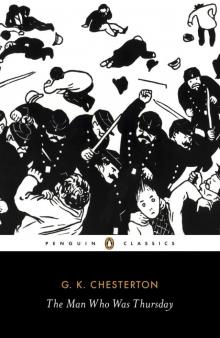 The Man Who Was Thursday: A Nightmare
The Man Who Was Thursday: A Nightmare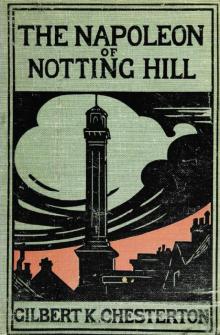 The Napoleon of Notting Hill
The Napoleon of Notting Hill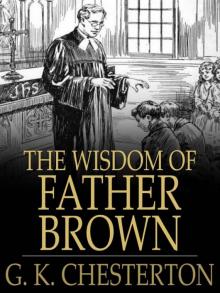 The Wisdom of Father Brown
The Wisdom of Father Brown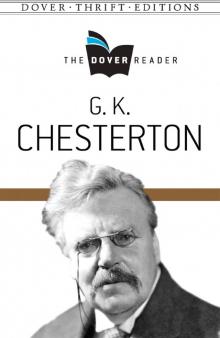 G K Chesterton- The Dover Reader
G K Chesterton- The Dover Reader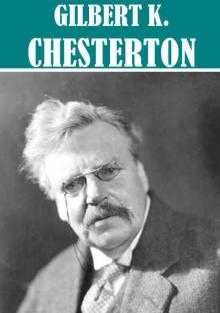 The Essential G. K. Chesterton
The Essential G. K. Chesterton The Trees of Pride
The Trees of Pride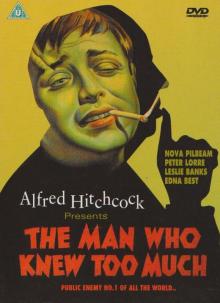 The Man Who Knew Too Much
The Man Who Knew Too Much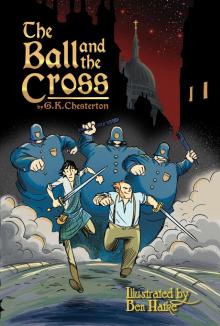 The Ball and the Cross
The Ball and the Cross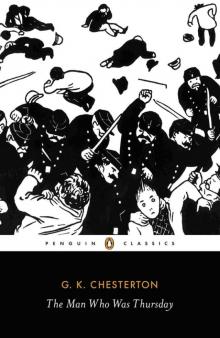 The Man Who Was Thursday (Penguin ed)
The Man Who Was Thursday (Penguin ed)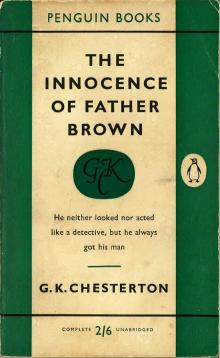 The Innocence of Father Brown
The Innocence of Father Brown The Victorian Age in Literature
The Victorian Age in Literature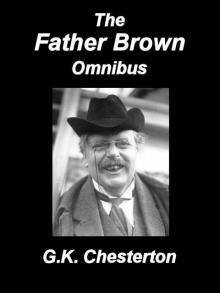 Father Brown Omnibus
Father Brown Omnibus Murder On Christmas Eve
Murder On Christmas Eve The Blue Cross
The Blue Cross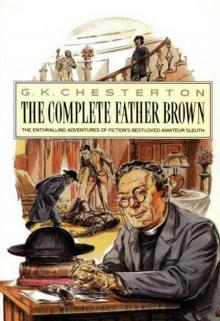 The Complete Father Brown Mysteries Collection
The Complete Father Brown Mysteries Collection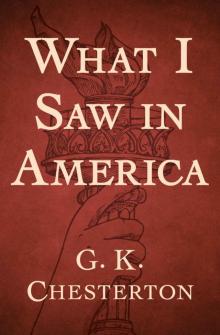 What I Saw in America
What I Saw in America